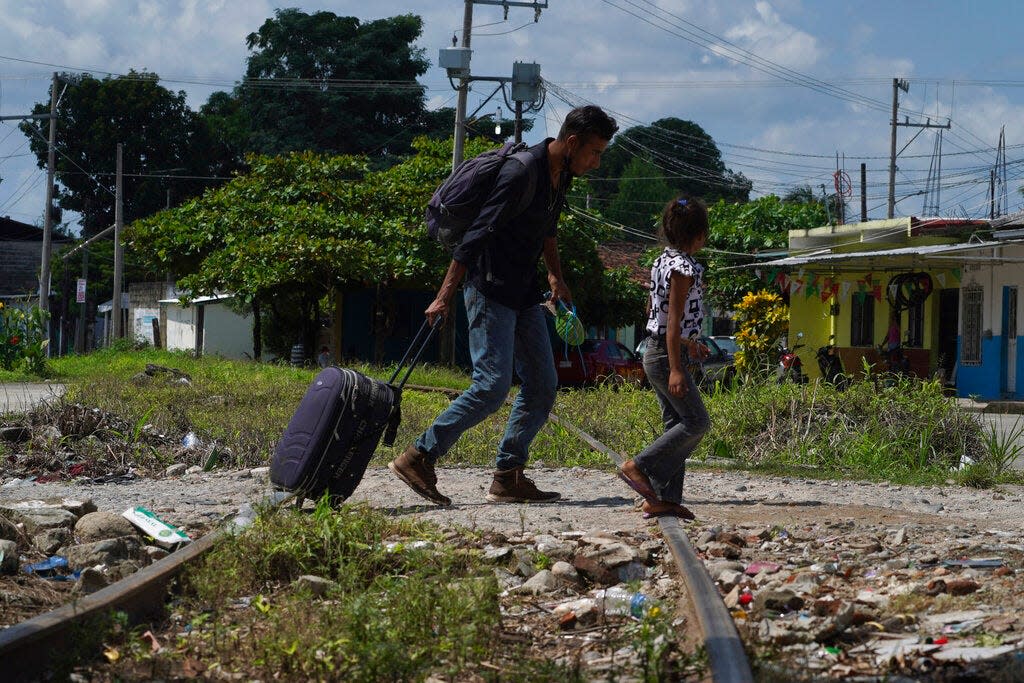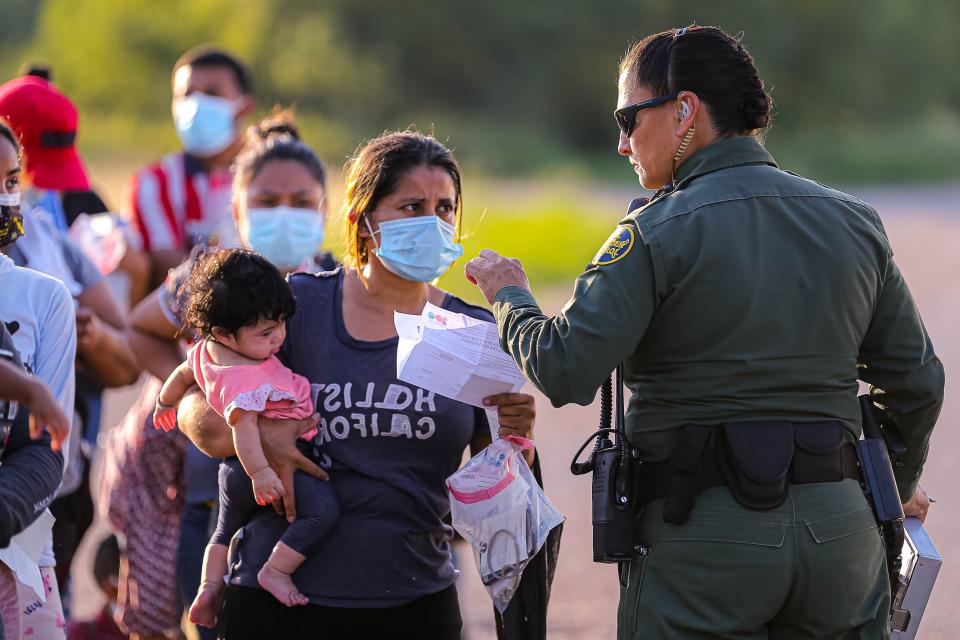Opinion: Humanitarian path needed to solve immigration crisis

In 1900, my family left their beloved Germany for the United States of America. Their destination promised freedom and the pursuit of happiness. Over a century later, 12 million undocumented immigrants are stripped of this promise.
Immigrants are often used as scapegoats for economic struggles and cultural changes in America. A frequent claim made by opponents of lenient immigration policy is that undocumented immigrants harm employment opportunities for U.S. citizens. Furthermore, these exaggerated claims contribute to the harsh conditions and policies undocumented immigrants go through.
Although studies show that undocumented immigrant employment slightly competes with U.S. citizen minority groups, further research states that the impact is meager. Restrictive policy and the harsh treatment of undocumented immigrants are a threat to the values of America and are encouraged by baseless and exaggerated claims.
The American attitude towards undocumented immigrants has often distorted the issue of immigration. Some politicians target undocumented immigrants as the scapegoat for economic troubles and a threat to the American way of life. In the Sociological Forum, Sociologist Douglas S. Massey writes "Economic instability naturally creates insecurity and anxiety among citizens…yielding feelings of vulnerability that are further aggravated by rapid sociodemographic changes stemming from immigration."
The villainization of undocumented immigrants pushes legislation that is restrictive towards undocumented immigrants and encourages the militarization of the southern border. Massey mentions the results of this nativist attitude contributes to, "The militarization of the border [which] continues with the extension of the border wall, the hiring of more agents by the Border Patrol and Immigration and Customs Enforcement (ICE), and increased budgets for apprehension and detention."
Central American countries, particularly Mexico, are subjected to horrible stereotypes that dampen their humanity. University of Texas Rio Grande Valley professor Terence M. Garrett repeats the harsh words of past President Trump, who is notorious for anti-immigrant beliefs. "…The (President Trump) referred to Mexican immigrants as rapists, promised to build a wall to keep them out, and pledged to deport those Mexican migrants who have into the U.S.A illegally." Anti-immigrant sentiments villainize undocumented immigrants and devalue the American dream for millions of immigrants and asylum seekers.
An argument against immigration-friendly legislation is that undocumented immigrants harm employment opportunities and pay rates for U.S. citizens. Political writer John B. Judis writes in "The American Prospect" that a study from the Brookings Institution found "…the greatest percentages of immigrants find unskilled work in agriculture, health care (as aides), housekeeping, and food service." The competition of immigrant employees brings challenges to minority native U.S. citizens, such as African Americans and Hispanics. Judis states, "… studies are showing that workers from these two groups have been struck by competition from immigrants."
One of these studies comes from the U.S. Civil Rights Commission. The organization found that "…illegal immigration to the United States in recent decades has tended to depress both wages and employment rates for low-skilled American citizens, (especially) Black men." However, is the blame to be put on the immigrants who come to America for economic opportunity and safety, or the companies that hire undocumented immigrants to diminish unions and decrease the quality of working conditions?

To illustrate, the meatpacking industry employed unionized workers who earned $18 an hour, but over time, meatpacking plants began to hire undocumented immigrants. This action caused native-born U.S. workers to leave, and conditions worsened for the undocumented workers left behind. Meat-packing plants often hire Mexican or Guatemalan undocumented immigrants who work for $6 an hour. Studies have shown that undocumented immigrants can compete with native-born minority groups. However, undocumented immigrants face low wages and harsh conditions. Other studies have shown that the impact of undocumented immigrant labor is not significant enough to cause inhumane legislation to the vulnerable population.
Undocumented immigrants have at most a minor impact on native-born workers. Studies have been unable to show a strong negative impact between undocumented immigrants joining the U.S. workforce and native-born workers. However, studies have been able to show a slight correlation between undocumented immigrants and U.S. minority groups in regards to employment. However, the focus should be on paving a way towards citizenship to the twelve million undocumented immigrants present in the country and seizing the continuation of inhumane treatment through the use of detention centers and restrictive immigration policy.

Undocumented immigrants in the United States face restriction and racism through policy and detention centers. The public often supports this type of policy and centers through anti-immigration rhetoric based upon baseless claims, such as the exaggerated claims on undocumented immigrant employment. Lawyer and immigration detentions researcher Danielle C. Jefferies writes in the Indiana Law Journal, “…the U.S. immigration system is the largest in the world… Nearly 400,000 people are incarcerated under the government’s immigration detention authority each year.”
In the U.S., many undocumented immigrants who have not committed crimes are sent to live in detention centers, often run by Immigration and Customs Enforcement (ICE) or private prisons. Many private prisons whose purpose is to detain undocumented immigrants often earn huge profits. Jeffries adds, “…a similar two-thirds of all people in the government’s civil custody for migration-related reasons are living behind the walls of a prison constructed to generate income and turn a profit for its shareholders.”
Another interesting point raised by Jeffries is the unconstitutionality of the private prison system spired on by the harsh treatment of undocumented immigrants in these detention systems. Jeffries highlights, “The inability of people in for-profit immigration confinement to hold their jailers constitutionally accountable undermines the constitutional value of dignity.”
Similarly, ICE facilities do not uphold the constitutional value of dignity. In an inspection of four detention centers, the Department of Homeland Security holds standards that require health and safety, detainee care, activities and grievance systems (as cited in Congressional Digest, 2021, p. 7). After the inspection, the Department of Homeland Security ruled that each of the four facilities violated ICE’s detention standards, "Our inspection of the four detention facilities revealed violations of ICE’s detention standards and raised concerns about the environment in which ICE holds detainees in these facilities."
Not only do undocumented immigrants face rough conditions in ICE and for-profit detention centers, but harsh policies in states such as Arizona and Alabama are also a scary reality even outside of jail cells. Author of Killing the American Dream Pilar Marrero highlights the Arizona Law or SB 1070 which allows police to utilize racial and ethnic profiling in confirming immigration status. This portion of SB 1070 encourages discrimination and fear of undocumented immigrants. Another Arizona law, Proposition 200, prevents undocumented immigrants from receiving public services.
These types of restrictive and discriminative policies found their way into the Southeast, particularly Alabama. HB 56 requires that the legal status of a suspect is determined by the police who have “reasonable suspicion,” prevents social services to undocumented immigrants, and more restrictive requirement. With these strict policies and the inhumane treatment of undocumented immigrants in ICE and private detention centers, the United States of America can be a scary environment.
Like so many generations before, many immigrants migrating to the U.S. seek economic opportunities and a higher quality of life. However, Massey further researches in his 2020 publication in The Sociological Forum of the populations that seek refuge in the U.S. The emergence of individuals crossing into America has declined, according to Massey’s findings. Furthermore, in May 2019, "…nearly two-thirds of those apprehended were traveling in family units, and only 28% were traveling alone." Many individuals crossing the border alone are Mexican, however, there appears to be a decline of single migrants. Instead, there is an increase in families seeking refuge in the U.S. In particular, many families seeking refuge come from the Northern Triangle.
Specifically, Massey provides statistics of ethnicities of families seeking refuge, "92% were from the Northern Triangle, (37% from Honduras, 39% from Guatemala, and 17% from El Salvador)." This statistic challenges the stereotype of an immigrant and their intentions in crossing the southern border. Massey raises an interesting point for the cause of increasing refugees from Central America. America’s military and political intervention during the 1980s in the area caused turmoil for the natives, and they are beginning to migrate north to safety. Because of this, "…undocumented immigrants from the Northern Triangle continue to arrive at the nation’s southern border seeking refuge from harsh economic circumstances and asylum from ongoing threats to life and limb."
The refugee population from the southern border worldwide and immigrants who are seeking a better life deserve to be treated from a humanitarian perspective. National security is important, but the United States must extend our values of freedom, the pursuit of happiness, and justice to these vulnerable populations.
Immigration reform has long been promised, but undelivered. Twelve million undocumented immigrants are currently in the United States. There needs to be reformation that allows for a path to citizenship and assimilation. The cost to deport one immigrant is $23,000. It is extremely expensive to deport undocumented immigrants, and it does not solve the recurring illegal entry into the United States. Protests and movements such as the Dream Act are just the beginning of immigration reform. It is crucial to recognize the role of the United States on the world stage and to approach immigration reform not as punishing criminals, but as a promoter of humanitarianism.
It is important to educate and bring awareness to the stereotypes and dramatized fear of immigrants, and recognize immigrants’ positive contributions to the U.S. for years. Americans are incredibly blessed to be protected by a Constitution that values freedom and prosperity. Immigrants from all over the world come to the U.S. for refuge, economic prosperity, and higher quality of life. Immigrants, including my family from Germany, trusted America to offer them the pursuit of happiness and freedom. The only solution to the immigration crisis is acceptance of the mistakes and a collaborative policy that stays true to our immigrant roots.
Brooke Rouse is a senior studying communications and new media at Mount St. Joseph University.

This article originally appeared on Cincinnati Enquirer: Opinion: Humanitarian path needed to solve immigration crisis

